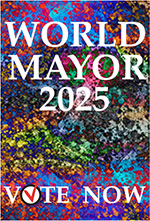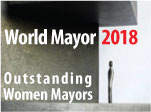
FRONT PAGE
About World Mayor
City Mayors Foundation
Email
worldmayor@gmail.com
Tel: +44 20 8439 7978
 

WORLD MAYOR 2018
• VOTE NOW
• Shortlist 2018
• Longlist 2018
• Raison d'être
• World Mayor history
• World Mayor Prize
• Code of Ethics
• Criteria
• Meet the Press
WORLD MAYOR 2016
• Results 2016
• Project 2016
• Shortlist 2016
• Longlist 2016
• Code of Ethics
• World Mayor Prize
• World Mayor History
• Raison d'être
INTERVIEWS WITH
• Mayor of Athens
• Mayor of Lahr
• Mayor of Mechelen
TESTIMONIALS
• Mayor of Aleppo
• Mayor of Amstelveen
• Mayor of Athens
• Mayor of Cologne
• Mayor of Gdansk
• Mayor of Grande-Synthe
• Mayor of Hettstedt
• Mayor of Lahr
• Mayor of Lampedusa
• Mayor of Lesbos
• Mayor of Mechelen
• Mayor of Philadelphia
• Mayor of Schwäbisch Gmünd
ESSAYS BY
• Mayor of Aleppo
• Mayor of Amstelveen
• Mayor of Athens
• Mayor of Gdansk
• Mayor of Lahr
• Mayor of Mechelen
• Mayor of Schwäbisch Gmünd
PROFILES OF
• Mayor of Amstelveen
• Mayor of Athens
• Mayor of Cologne
• Mayor of Gdansk
• Mayor of Grande-Synthe
• Mayor of Lahr
• Mayor of Lampedusa
• Mayor of Lesbos
• Mayor of Mechelen
• Mayor of Schwäbisch Gmünd
WORLD MAYOR 2014
WORLD MAYOR 2012
WORLD MAYOR 2010
WORLD MAYOR 2008
WORLD MAYOR 2006
WORLD MAYOR 2005
WORLD MAYOR 2004
|
|
World Mayor 2016 honours mayors
for services to integration and refugees
By Tann vom Hove, Senior Fellow
14 February 2017: The international World Mayor Project has been honouring exceptional mayors since 2004. The aim of the Project, founded and run by the London-based City Mayors Foundation, is not just to raise the profile of mayors, who have made significant contributions to cities nationally and internationally, but to involve as many people as possible from all parts of the world. Interest in local affairs has been fallen right across the world. In many countries only a minority of the electorate participate in local elections – some mayors in important US cities are elected on a turnout of less than 20 per cent.
• The World Mayor Project
• The first round
• The second round
• Past winners and runners-up
• The World Mayor sculpture
• The City Mayors Foundation
To make local affairs more engaging, World Mayor was conceived as a competitive project that invites members of the public to nominate outstanding city leaders for the World Mayor Prize. Participants are asked to describe the qualities and accomplishments of their chosen mayors and are also encouraged to compare the challenges faced by their own cities with those in other parts of the world. The nominated mayors and those ultimately shortlisted for the Prize are therefore chosen by a committed international audience rather than by a panel of ‘experts’.
The World Mayor Project
When the rules for the World Mayor Project were established, the City Mayors Foundation emphasised that the strength of argument expressed in testimonials carried more weight than their actual numbers. By stressing the significance of well-argued comments, the organisers aim to ensure that project participants think carefully about the merits of their chosen mayors. A cross-selection of the most interesting testimonials are published on the World Mayor website. The rules also enable mayors from smaller towns to compete on equal terms with those from large metropolises.
While in previous years municipal leaders were nominated because of their general qualities such as honesty, management abilities, financial acumen, social, economic and environmental awareness, the 2016 shortlist is made up of mayors who have contributed extraordinarily to the acceptance and integration of refugee and immigrants.
In the preamble to the 2016 World Mayor Project, the organisers state that at a time when there are some 60 million displaced people worldwide and hundreds of thousands flee disaster-torn areas and poverty, it ultimately falls on towns and cities to provide emergency shelter, security and future prospects.
For World Mayor 2016, the City Mayors Foundation looked for mayors who recognised that people, whatever their origin, status or background, are the greatest capital the world has to offer. The 2016 World Mayor Project has identified mayors whose cities have done the most to welcome immigrants and have used their skills to enrich and diversify society culturally, economically and socially.
All mayors on the 2016 shortlist and particularly the final top ten have shown compassion, courage and competence. Compassion for people who have travelled great distances to find safety. Courage to fight prejudice even in the face of unpopularity. Competence to leverage the value and potential each person offers society.
The first round
The 2016 World Mayor Project was conducted over two rounds. During the first round of World Mayor 2016, which took place from February to October 2016, the Project’s organisers invited the public to submit nominations of mayors who, in their opinion, fulfilled the Project criteria. Nominations had to be accompanied by statements detailing mayors’ qualities and achievements. At the end of September 2016, the longlist comprised 38 mayors – 23 from Europe, 10 from North America, one from Latin America and four from Asia. The beginning of the 2016 World Mayor Project coincided with the arrival of the largest number of refugees and migrants Europe had seen since World War II. Mayors in Greece, Italy, Germany and other continental European countries faced major challenges, initially with little government support. The composition of the longlist reflects the enormous challenges European communities were virtually overnight confronted with in 2015 and 2016.
The second round
In October, World Mayor announced the 15-mayor shortlist. Again, European mayors dominated the compilation. In addition to 11 mayors from Europe, the shortlist included two from North America and another two from the Middle East, including the Council President of what was then Eastern Aleppo.
Many of the final nominees came from smaller towns and cities, including Rutland in Vermont USA), Amstelveen (Netherlands), Lahr (Germany) or Lesbos (Greece). Larger communities included the cities of Athens, Cologne and Gdansk. With the exception of the Mayor of Lampedusa (Italy), all nominees were shortlisted for the first time.
From October until Christmas 2016, the public was invited to select from the shortlist of 15 mayors their choice of candidate for World Mayor honours. Similar to round one, participants were asked to provide a persuasive testimonial to back up their choice. Mere comments like ‘she is the best mayor in the world’ or ‘he is such a great guy’, were not considered by the jury.
World Mayor 2016 did not offer a click-voting option. Each shortlisted mayor was allocated a unique email address to which participants had to send their votes and comments. This method largely eliminated frivolous and manipulated voting. The organisers also introduced two additional filters to detect instances of fraudulent voting.
Following the closure of the second round, the organisers of the 2016 World Mayor Project began a process of verification and evaluation. In January 2017, the World Mayor jury decided on a list of ten mayors who stood out in terms of accomplishments as well as support from their citizens and peers. All top-ten mayors also received considerable support from outside their communities and even countries.
Past winners of the World Mayor Prize and Commendations
In 2004 Edi Rama won the Prize for his achievements in turning the drab and neglected post-communist capital of Albania into a thriving western European city. Edi Rama is now Prime Minister of Albania.
As Mayor of Athens, Dora Bakoyannis contributed substantially to the success of the 2004 Summer Olympics. After receiving the 2005 World Mayor Prize, she was appointed Greek foreign minister.
John So, the winner of World Mayor 2006, was Melbourne’s first directly elected Lord Mayor. Born in Hong Kong, he represents an example of the ‘Australian dream’.
Helen Zille, Mayor of Cape Town, and winner of the 2008 World Mayor Prize, was described as an ‘amazing lady’ who in a country devoid of present-day role models was making a difference and giving people hope. One admirer said: “Her only equals are Desmond Tutu and Nelson Mandela in Southern Africa.” Helen Zille is now Premier of the Western Cape Province.
Marcelo Ebrard, Mayor of Mexico City, was awarded the 2010 World Mayor Prize. Marcelo Ebrard was Mayor of Mexico City from 2006 to 2012. During his time in office, the mayor never shied away from challenging Mexico’s orthodoxy. He championed the rights of women and minorities and became an outspoken and internationally respected advocate on environmental issues.
Iñaki Azkuna, Mayor of Bilbao, Spain, was awarded the 2012 World Mayor Prize. It had been said that Bilbao’s transformation from a declining industrial city in Spain’s northern Basque Province to an international centre for tourism and the arts has been sparked by two events: the opening of the Guggenheim Museum in 1997 and the election of Iñaki Azkuna as mayor two years later.
Naheed Nenshi, Mayor of Calgary, Canada was warded the 2014 World Mayor Prize. The mayor has antagonised much of conservative opinion in Calgary and provincial Alberta but has secured strong support for his leadership. He has used social media extensively and emphasised the need to further diversify the city economy. Transparency and dialogue are the central principles of the mayor’s approach. In 2014 he was a signatory to a document, which took forward the case for Charter status for Alberta’s cities.
World Mayor runners-up were:
In 2004: Andrés Manuel López Obrador (Mexico City}; in third place - Walter Veltroni (Rome, Italy).
In 2005: Hazel McCallion (Mississauga, Canada); in third place - Alvaro Arzú (Guatemala City).
In 2006: Job Cohen (Amsterdam, Netherlands); in third place - Stephen Reed (Harrisburg, USA).
In 2008: Elmar Ledergerber (Zurich, Switzerland); in third place - Leopoldo López (Chacao, Venezuela).
In 2010: Mick Cornett (Oklahoma City, USA); in third place Domenico Lucano (Riace, Italy).
In 2012: Lisa Scaffidi (Perth, Australia); in third place Joko Widodo (Surakarta, Indonesia).
In 2014: Daniël Termont (Ghent, Belgium); in third place Tri Rismaharini (Surabaya, Indonesia)
The World Mayor Prize sculpture
French artist Manuel Ferrari designed the World Mayor Prize sculpture in 2004. The City Mayors Foundation invited the artist to create a sculpture that was as unique as the city of the winning mayor. The chosen design of three interlocking cubes emphasises the need of growing cities to be built on strong foundations. A slim, upward-looking figure symbolises all those citizens who chose cities to realise their ambitions. The sculpture is hand crafted by Berlin-based blacksmith Kaspar Swankey.
The City Mayors Foundation
The World Mayor Project and The City Mayors Foundation have no connection with any city or organisation and are run on philanthropic lines. The Foundation is financed and maintained by its fellows according to their means and expertise. Sponsorships, advertising, subscriptions, donations or any other kind of revenues are not sought, and if offered, are rejected.
|




